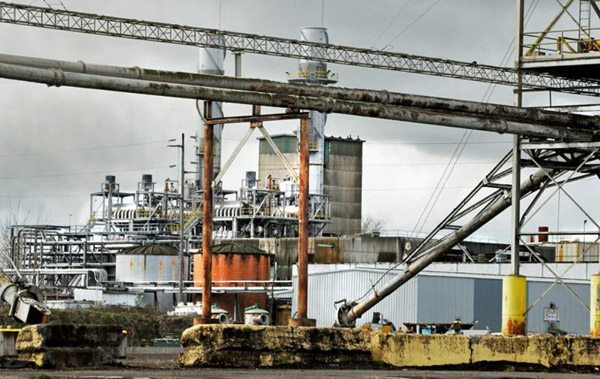WestRock Turns Down Several Offers to Sell Paper Mill in Newburg, Oregon
![]() Print this Article | Send to Colleague
Print this Article | Send to Colleague
According to a report this past week (Aug. 16, 2018) by the Portland Tribune (Portland, Ore., USA) two interested buyers of the shuttered Newberg paper mill report little to no current interest from WestRock (Norcross, Ga.) more than a month after WestRock told the Tribune it is now open to selling its property to another mill operator rather than demolishing its papermaking equipment so the mill can't be reopened.
Oregon's recycling sector has high hopes that a closed Northwest paper mill can be restarted, using as feedstock the recycled paper that is collected at curbsides but now gathering dust or being buried in landfills since China stopped buying our scrap paper. The Newberg mill was viewed as a prime candidate, until the Tribune reported June 7 that WestRock had inked an $8.25 million contract to sell its property on condition that the papermaking equipment be turned into scrap metal.

After that story appeared, WestRock Corporate Communications Director John Pensec called the Tribune and said that deal was dead and the company now is open to new offers, including selling to mill operators. Since then, Rahul Kejriwal, who works for his family's mill and textile company in India, and Mu Lin, whose father owns a papermaking company in China, have been rebuffed by WestRock after expressing eagerness to buy and restart the Newberg mill. Both say they would turn locally collected recycled paper into pulp to make new paper.
"They've made absolutely no effort to reach out to Rahul and the Chinese company," said Greg Pallesen, president of the Portland-based Association of Western Pulp and Paper Workers.
Kejriwal has tried to contact them and offered to bring his financial advisors to Atlanta (Norcross), Pallesen said.
"He told them he would sign a noncompete agreement with them," Pallesen added. "They will not meet with him."
Kejriwal declined an interview, but in an email wrote that he "had not gotten a clear, positive response from them yet." He handles acquisitions for Kejriwal Group International, which wants to supply more newsprint to the Indian newspaper industry. Unlike in the U.S., newspapers are thriving in India, where literacy is growing and the infrastructure to read news online lags much of the world.
Mu Lin, a Reed College graduate whose father owns Forest Packing Group in Zhejiang, China, said the response he got from WestRock was "pretty cold."
"I don't think WestRock is exactly looking for a purchaser," he relayed in an email. Lin said his company could invest $100 million to $200 million to restart the Newberg mill, including new equipment and permitting, and still make a profit. WestRock bought the Newberg mill in 2015 and subsequently closed it down, along with a second mill that was part of the acquisition.
"The status remains the same from when we last spoke, which is that we are assessing the best use of the Newberg facility," Pensec wrote in an e-mail to the Tribune. "We will take some time to determine the next steps and do not have an identified timeframe for any decision."
That's almost identical to the words WestRock used in an email response to Mu Lin, and to the remarks of WestRock CEO Steve Voorhees in an August 2 conference call with stock analysts.
According to a transcript of the conference call, Goldman Sachs analyst Brian Maguire asked Voorhees about the empty Newberg mill, noting recent publicity and the role it might play in "potentially being a solution to China's ban on mixed paper." Maguire noted there's renewed interest by Chinese investors in buying U.S. mills, and asked if WestRock might re-evaluate its plans and restart the mill or seek some new partnership to reopen it. Voorhees responded that his company is "now assessing the best use of the Newberg facility. It's going to take some time for us to determine the next steps, and we don't have an identified timeframe to make that decision."
It could be that WestRock is simply taking its time before considering purchase offers. Pallesen said no other parties besides the Indian and Chinese companies have shown interest in buying the mill, and he would hear about it if there were. Pallesen suspects WestRock is biding its time while the U.S. Federal Trade Commission weighs a major WestRock bid to buy Kapstone Paper and Packaging.
Recycling industry expert Jerry Powell, editor and publisher of Portland-based Resource Recycling Inc., said recently that if a market isn't found to use Oregon's recycled paper scraps, it could "destroy curbside recycling." Paper accounts for an estimated 60% of what Oregonians put in their recycling bins. China's ban on accepting our mixed paper scrap has caused a shortage of pulp there to make paper — and driven up the potential profit of a reopened Newberg mill. So has the steep tariff on Canadian exports of paper to the United States that the Trump administration imposed, though it's unclear how much of that tariff ultimately will stick.
One paper industry source active in world markets said the cost of labor only accounts for 7% to 8% of mill costs here, and the price for raw material to make paper is several times that. But with some Oregon solid waste authorities literally paying to get rid of their recycled paper scraps by burying it in landfills, that makes the price of raw material for a would-be paper mill in Newberg unusually attractive, although an ongoing operation would deplete the strong surplus of material to some extent.


